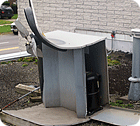
Air conditioners continue to be hot items, but they are not being used strictly to cool homes and buildings. Ever since the demand for copper began to climb and the price for the metal skyrocketed to historic highs this year - particularly over the summer months - thieves have been following the money chain, stealing outside units from backyards and atop buildings, mainly for the copper content inside. You see, where there is copper, money is to be made. Big money.
"This is just crazy," Springfield, Ohio, police chief Detective Geoff Ashworth told the Associated Press earlier this year. In as early as January in his jurisdiction, Ashworth said he was taking up to two metal theft reports a day.
"And, there's no one or two, there's no six people that are specifically responsible for this. Everybody's doing it. People know the prices are up."
Never mind that copper prices have stabilized, somewhat, over the last two months, this has not completely stopped some people on a mission. Scrap metal yards, construction sites, and external air conditioning units are still among the most common targets for copper thieves, who sometimes cause tens of thousands of dollars in damage to harvest relatively small amounts of the metal.
Though firm numbers are not necessarily available, thieves can sometimes net $100 to $200 for copper stolen from an air conditioning unit. But, those numbers inflate with more copper collected, be it from one's next-door neighbor's backyard or the commercial building down the street.
"Whenever the cost of those metals go up, there's a rash of thefts of them," Orangeburg, S.C., County Sheriff's Office Major Barbara Walters told the local newspaper, The Times and Democrat. "We believe the stolen copper and other metals are being sold for scrap metal."
And, yes, that includes cashing in on stolen a/c units, wherever they might be found or anchored.
NOW YOU SEE THEM...
"With the skyrocketing values of these metals, it makes it lucrative to steal the items and sell them," explained Joseph Rich, owner of Sunshine Recycling, Orangeburg, S.C. "We're paying $1.07 a pound for copper if it's clean, free of contaminants. But if it has contaminants like steel ends, or rubber insulation around the copper, it sells for about 86 cents a pound."This South Carolina town of 13,000 has had its share of stolen a/c units. For instance, the owner of local Bethea's Funeral Home reported to deputies that someone took the copper coils from the a/c unit at its business. All totaled, this caused an estimated $4,500 in damage.
Need another example?
In this same small community, a local real estate agent told deputies that the copper coils were taken from the air conditioner at a house he is in the process of selling. The damage there was also estimated at $4,500.
Meanwhile, a local church was hit twice. The caretaker told deputies he was summoned to the church at about 4:30 p.m. by a men's group meeting at Greater Faith Baptist Church. They complained that the building was too hot and the air conditioner was not working properly.

Unfortunately, the next day - at 5:40 a.m. - local authorities were again called to the church. Upon arrival they found that someone had thrown a cinder block through a window to gain entry. They found nothing missing inside the building, but investigating the outside they found that more air conditioner parts had been taken. It is estimated that $3,700 in damage was done to the air conditioning unit during the two burglaries.
And, this is just one small town's tale.
Shumate Mechanical, a family-owned contracting business that serves the heating and cooling needs of the Atlanta area, can relay an uncomfortable incident that happened this past August. In this scenario, local Gwinnett County police were investigating a suspicious vehicle at a business in Duluth, Ga., only to arrest two copper thieves just before 1 a.m. on a Wednesday. The two told officers they had permission to be there and to take items, but a representative of Shumate Mechanical, which is headquartered in Duluth, said they did not.
In this particular case, it was Frank Steinocher, the company's information officer, who took it upon himself to stop the madness. He had enough after coming to work on a Monday morning only to find the copper guts ripped out of some of the air conditioner company's cooling units. Again.

So the two Shumate Mechanical employees decided to stake out the company's warehouses. The idea of playing commando in their warehouse struck Decker and Steinocher as mildly ridiculous, but copper theft had become a serious problem for the company. According to Steinocher, $50,000 worth of copper had been stolen from the company's other work sites over the past few months.
The two alleged thieves made their appearance shortly after the two had begun keeping an eye on the place. In early August, the thieves drove up shortly after midnight in a rented Jeep with the same license plate number noted by Shumate's cleaning crew a few days earlier, Steinocher said. They had no intention of confronting them directly, Steinocher said. While the two began taking the copper wires out of one of the air conditioners, Steinocher called police.
When the cops came, one thief first claimed that he and his partner had permission to take the items, Steinocher said. Then Decker and Steinocher walked around the corner to say otherwise.
The two accused thieves later admitted that they had taken copper from the same company before and had receipts for more than $1,000 of recycled copper when arrested, along with the tools needed to remove the copper coils from the air conditioners.
"This is a statewide problem, not a local problem," police spokesman Cpl. Darren Moloney told the Atlanta Journal-Constitution.

MORE BUSINESS FOR CONTRACTORS, OTHERS
Because stolen or stripped commercial and residential a/c units need to be replaced or repaired, the end result means more business for heating and cooling contractors. This also means the general print media has been turning to - and interviewing - HVAC contractors to get answers and their respective outlook on the chaos.For instance, earlier this year, The Wall Street Journal (WSJ) approached Larry Taylor, president of AirRite Air Conditioning Co., Fort Worth, Texas. At that point in time, Taylor said his company was receiving a service call nearly every day - over a 40-day period - from a home or business owner whose air conditioning had been damaged or stolen. In the same WSJ report, Brenda Hawk, an office manager for Camair Inc., said that the Orlando, Fla.-based contracting firm was getting about four times as many telephone calls this summer compared with last year regarding stolen or gutted a/c equipment.
In addition to contractors, security folks have been and are getting a boost in business on account of a/c thefts. And, in this case, the issue at hand isn't home or business automation to link alarm control systems with over-the-phone or over-the-Web control of automated systems. Rather, the issue is the old-fashioned concern of common theft.
In other words, the thefts are becoming a business source for alarm companies, who are often being asked to add theft sensors to the air conditioning units. Still, according to most, the common response is for the end users to add secure fences and motion-sensing lights.
SecurityInfoWatch.com reported on its Website that a security business located in Fayetteville, N.C., was wiring air conditioner units such that if the unit or copper is stolen, an alarm signal is raised. Holmes Electric Security Systems Inc. also noted that, as late as August, they were getting calls approximately every other day to install air conditioning protection systems in the Fayetteville area and the surrounding vicinity.
Meanwhile, in Detroit, a Majestic Heating and Cooling service technician put together an invention designed specifically to thwart, if not stop, a/c thefts. (See related story concerning Joe Wojtowicz and his AC Watch Dog Alarm System, "Rising A/C Unit Thefts Inspire New Hardware," in this issue.)
The bottom line is this: Should copper prices remain at their current level or possibly soar higher in the not-so-distant future, expect more of the same - or possibly worse - in regard to a/c thefts.
Sidebar: Hard to Trace
According to scrap metal dealers, it is virtually impossible to tell whether copper has been stolen. As they explain, metal bears no serial numbers, and old and new copper wire or piping looks the same.That is one reason why the gutting of outdoor a/c units continues. Thieves are taking the content of residential and commercial units for the copper contained within each.
For the most part, police collectively believe the culprits are usually petty criminals looking for some quick money. Those who are arrested are often charged with burglary or larceny, depending upon the circumstances of the theft, and face fines, probation, or several years in jail. In the long run, most people can be reimbursed through homeowner's insurance, but often must pay a deductible.
"The guy who used to collect beer cans for redemption values says, ‘Why should I do that? I can get 10 times that for a fraction of the work,' by stealing air conditioners," said Nathan Frankel a scrap yard owner in Fontana, Calif. Frankel made such an observation to the Wall Street Journal (WSJ).
In response to the rash of a/c unit thefts and other copper-related swipes, cities are starting to crack down. In Montgomery, Ala., for instance, the city recently passed an ordinance requiring scrap yards to report the copper they take, in to the police department. Meanwhile, in Detroit, the city is trying to make sure that local scrap yards are licensed and recollecting identification information from people who sell them the metal.
Chuck Carr, a spokesperson for the Institute for Scrap Recycling Industries in Washington, informed WSJ that his association is bewildered by the sudden surge in a/c thefts and all others. He said his organization - an association of metal recycling companies with about 3,000 scrap yards throughout the United States - has a scrap-theft alert system, designed to alert scrap dealers by e-mail when large lots of metal are reported stolen.
"No legitimate scrap dealer wants to intentionally take stolen material," Carr told WSJ. "Not only is it the wrong thing to do, it's bad for business on so many levels."
In another interview granted to The Associated Press (AP), Carr said he agreed that the scrap industry wants to be a part of the solution to the problem.
"We not only have a vested interest because it's the right thing to do," Carr told the largest and oldest news organization in the world, "but also because we're affected."
Sidebar: Tips to Pass Along to Customers
What can contractors do to help owners protect their outdoor units from being stolen or gutted out?Here are some suggestions collected from experts in the field.
1. Contractors should inform homeowners to secure the crawl space under their house.
2. A contractor can notify a residential homeowner that she/he can hide an outdoor air conditioning unit with a fence or shrubs or can secure a unit to the house with a padlock and chain.
3. Contractors should inform owners, both of residential dwellings as well as commercial buildings, to keep track of serial numbers on a/c units. Having this information comes in handy, especially if an a/c unit is stolen. It can be identified, if found, via the serial number.
4. Contractors are encouraged to inform homeowners to let neighbors know if they plan to have work done on their house - and, who will be coming and when. An alert neighbor could report seeing anything suspicious to local authorities.
5. Contractors should inform building owners never to assume. In other words, never assume service people and vehicles are legitimate. Contractors should tell owners to ask for identification or call the police if they are concerned.
- Mark Skaer
Publication date: 10/30/2006

Report Abusive Comment